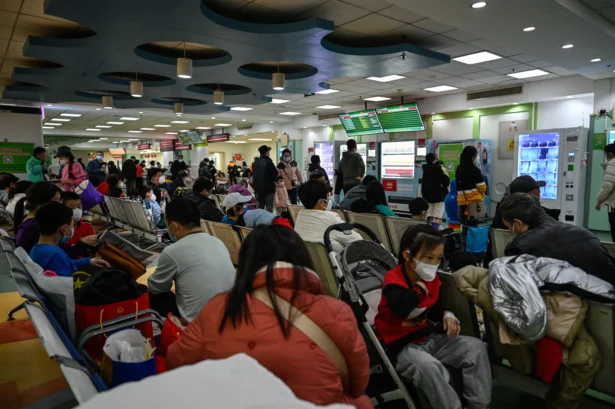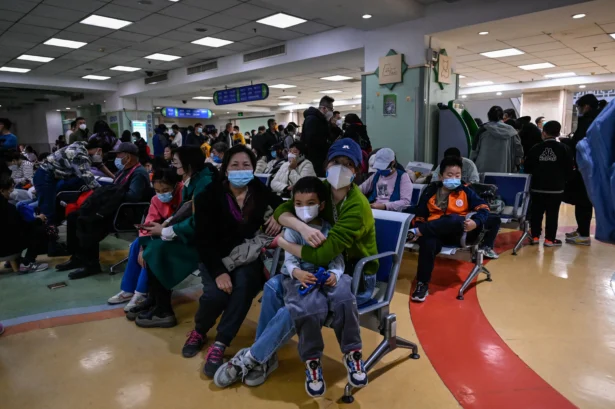The ruling Chinese Communist Party (CCP) announced that starting from the beginning of December, it will offer a visa-free policy for six European and Asian countries for one year. Meanwhile, the country is experiencing mysterious pneumonia outbreaks that have overwhelmed hospitals.
Mao Ning, the spokesperson of the CCP’s Ministry of Foreign Affairs, said at a regular press briefing on Nov. 24, “China has decided to apply unilateral visa-free policy to more countries on a trial basis, which involves extending visa-free treatment to travelers holding ordinary passports from six countries, namely France, Germany, Italy, the Netherlands, Spain, and Malaysia.”
She also stated that from Dec. 1 this year to Nov. 30, 2024, “citizens from the above-mentioned countries holding ordinary passports can be exempted from visa to enter China and stay for no more than 15 days for business, tourism, family visit, and transit purposes.”
Regarding the reason for visa-free trial, Ms. Mao claimed that it was “to further facilitate cross-border travel and China’s high-quality development and high-standard opening up.”
The timing of the relaxed visa entry requirements is suspicious because China is currently in the midst of a raging outbreak of undiagnosed pneumonia that mainly targets children.
Since mid-October, many children have been infected with pneumonia, having fever, and even exhibiting white lung symptoms as seen from serious COVID-19 infections in various regions in China. The cases skyrocketed further in November, overwhelming hospitals.

Chinese authorities claimed on Nov. 21 that multiple respiratory pathogens such as the SARS-CoV-2 virus, influenza virus, and mycoplasma pneumonia virus are allegedly causing mixed respiratory infections in the country.
COVID-19, the disease caused by the SARS-CoV-2 virus, was originally called “Wuhan pneumonia” in China, due to its symptoms when it first broke out in Wuhan, Hubei Province, in late 2019. The CCP concealed the truth and falsely claimed that the epidemic was preventable and controllable and would not be transmitted from person to person, which led to the outbreak spreading out of control and subsequently moving rapidly around the world, becoming a pandemic.
The CCP shut down domestic travel in and out of Wuhan in January 2020 due to the epidemic, but the regime continued to allow people to travel to international destinations. Wuhan officials admitted in early 2020 that more than five million people left Wuhan during that time, traveling to countries around the world.
WHO, ProMED Concerned
Reports of outbreaks of “undiagnosed pneumonia” in major Chinese cities have alarmed the World Health Organization (WHO) and ProMED, a large public health surveillance system that monitors human and animal disease outbreaks worldwide.
On Nov. 21, ProMed issued a notification detailing a reported epidemic of “undiagnosed pneumonia” in children in China.
It was ProMed’s alert in late December 2019 that brought the world’s attention to a mystery virus later named SARS-CoV-2, which had caused the COVID-19 pneumonia outbreak in China. The alert helped to inform doctors and scientists worldwide, including senior officials at the WHO.
At the end of the notification, ProMED staff said, “The pandemic clock is ticking, we just do not know what time it is.”

On Nov. 22, the WHO issued a statement on social media urging China to share information about the outbreak.
“WHO has made an official request to China for detailed information on an increase in respiratory illnesses and reported clusters of pneumonia in children,” it said.
CCP Continues to Deny
On Nov. 23, the WHO held a conference call with the CCP’s Center for Disease Control and Prevention and the Beijing Children’s Hospital regarding the WHO’s request for the undiagnosed pneumonia outbreak data from China the day before.
The CCP said that no “unusual or new pathogens” have been found in various regions, including Beijing and Liaoning Province, and no abnormal clinical manifestations have been found. Currently, they only acknowledge a general increase in respiratory diseases caused by the previously mentioned multiple known pathogens.
Chinese authorities also said that the overall number of patients hasn’t exceeded hospital capacity.
Sean Lin, an assistant professor in the Biomedical Science Department at Feitian College and a former U.S. Army microbiologist, said that when the COVID-19 virus cooperates with other respiratory viruses or mycoplasma pneumonia bacteria to break through the body’s immune system, more serious infections will occur, causing white lungs and other conditions in the lungs.
“COVID-19 has never really disappeared in China, and I think the officials are still covering it up,” he said.
Hospitals Overwhelmed, Death Toll Concealed
On Nov. 24, the CCP’s State Council issued a notice stating that the nationwide influenza “epidemic peak” will occur in winter and spring, and Mycoplasma pneumonia infections will continue to be “high in incidence” in the future.
According to videos and posts on social media and mainland Chinese media reports, currently, pediatric emergency departments in hospitals in major cities across the country, such as Beijing, Tianjin, Dalian, Shanghai, Nanjing, Wuhan, and other places, are all full, and medical staff are operating at full capacity 24 hours a day. It’s reported that patients who are having IV (intravenous) treatment even have to wait in line to get needles removed by nurses.
Zou Yingxue, chief physician of Tianjin Children’s Hospital, told the media that in the past week the number of medical appointments at the hospital exceeded 12,000 per day.
A large number of social media posts said that pediatric and emergency departments in hospitals are overcrowded, and many sick children can’t book appointments. The waiting time for treatment ranges from 12 hours to 24 hours.
Mr. Wu, a Beijing resident told NTD on Nov. 24, “Currently, the epidemic has broken out on a large scale in workplaces and schools, and many people have taken leave to recuperate at home. In some schools, half of the students are staying at home due to the disease. This is the case across the country, and the authorities do not report it for fear of causing panic.”
He also said that the outbreak has caused deaths from elementary schools to high schools, and there were no official notifications about it.
Mr. Ma, another Beijing citizen, also said that this wave of outbreak has claimed many lives. Normally, there is no need to wait in line to receive ashes at funeral homes, but now there is a long line. In Babaoshan, the largest funeral home in Beijing, it’s estimated that nearly a hundred peoples’ ashes have been given to their relatives per day.
“Last month, one of my brothers died of white lung [a typical symptom of a serious COVID-19 case]. Before 7 a.m., I arrived at Babaoshan. I had to wait in line for more than 2 hours to get his ashes. It only takes an average of 5 minutes to check a person’s ID [to get it]. How many people do you think were there [waiting to get ashes]?”
On Nov. 23, Zhao Lanjian, a former Chinese journalist currently residing in the United States, told The Epoch Times that a few days ago he learned from his contacts that there were many children suffering from pneumonia in Dalian city of Liaoning Province and some children died from it, such as an 11- to 12-year-old girl named Chen. However, Chinese authorities are censoring information about it.
Li Yun and Luo Yan contributed to this report.
From The Epoch Times
